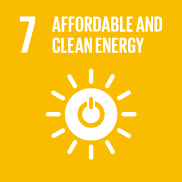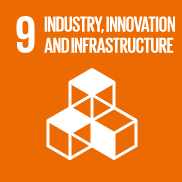Using Innovation to Address Societal Needs
Using Innovation to Address Societal Needs
MC strives to create businesses that address pressing societal challenges while driving significant industry reforms through innovation.
Related SDGs Themes
Action Plan for This Material Issue
MC recognizes that innovation has immense potential to solve societal and industrial challenges and enrich daily lives. The company is committed to achieving sustainable growth by transforming existing businesses and pursuing new opportunities generated by innovation.
Building a Cross-Industry Digital Ecosystem
Many of MC’s businesses are physically based and require digital transformation (DX) solutions. By integrating DX functions into these businesses, the company will optimize logistics, improve productivity, increase business value, and contribute to industry development and vibrant local communities.
By developing cross-industry DX functions that leverage its extensive business expertise and offering them as services, MC will enhance the value of industries as a whole. To achieve this, the company aims to boost productivity across both industries and society, creating sustainable value through the establishment of a “cross-industry digital ecosystem,” a network where industries, companies, local communities and other stakeholders can organically connect and coexist.
Activity at MCD3
MCD3, Inc. serves as the strategic digital arm of Mitsubishi Corporation. Established on July 1, 2025 through the integration of Industry One, MC Digital, and MC Data Plus, MCD3 combines Design, Digital, and Data to create an end-to-end operating model that seamlessly connects business ideation to service delivery—maximizing customer value and accelerating digital transformation across industries.
MCD3 is committed to addressing urgent social challenges, such as the rapid decline of the working population and the pressing need to boost productivity. By leveraging and scaling its expertise and services, MCD3 strives to deliver greater social impact.
Reduction of Food Waste
In 2019, food waste in Japan was estimated at 5,700,000 tons, an amount equivalent to 1.4 times the World Food Programme’s global food aid in 2020. Approximately 54% of Japan’s total food waste occurs during the distribution and production process, making it a critical issue for the food distribution industry.
MC is advancing initiatives to reduce food waste through the use of digital technologies, including AI. Several MC operating companies have set ambitious targets, aiming to reduce food loss by 50% by 2030 through measures such as improving distribution efficiency.
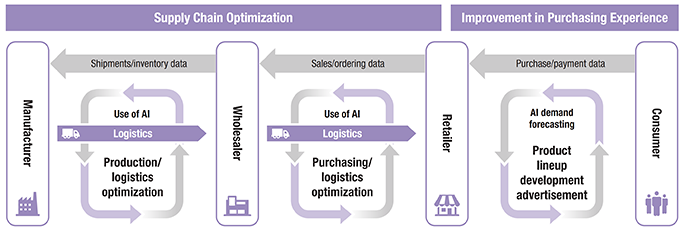
DX Business in Food Distribution
MC has initiated the development of solutions that enable demand forecasting and automated ordering for food wholesalers. By leveraging AI to calculate optimal order quantities—preventing shortages while reducing excess stock—and linking these calculations directly to actual orders, the concept of “purchasing of necessary amounts of necessary items” becomes achievable. This approach allows MC to contribute significantly to reducing food waste at the wholesale level. In demonstration experiments, the solution successfully reduced stock volumes compared to traditional manual ordering processes, while also lowering the probability of stock shortages. These results indicate strong potential for effectiveness.
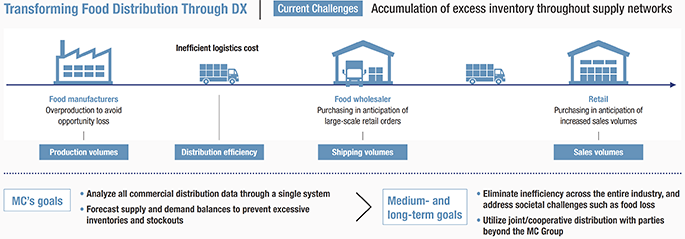
Optimizing the Entire Supply Chain through Digital Technology
Supply chains connecting producers and consumers rely on effective combinations of storage and transportation logistics. Japan’s domestic warehousing market, valued at approximately nine trillion yen, plays a central role in these supply chains. However, challenges such as labor shortages, reliance on specific individuals for specialized tasks, and rigid lease agreements have led to inflexible inventory capacities. These constraints have contributed to wasteful, inconsistent, and burdensome fulfillment practices across multiple industries. Similar issues are emerging in other countries, including the United States and China, prompting innovators to develop new business models. Examples include self-driving warehouse robots and platforms that enable users to share vacant warehouse space.
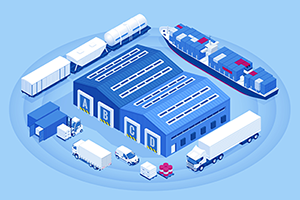
Gaussy’s Warehouse DX Services
The “Roboware” subscription service enables anyone, regardless of background or technical expertise, to easily manage warehouse operations using robots, offering a practicle solution to labor shortages and overreliance on the issues mentioned above. Similarly, “WareX” provides a simple platform for sharing available warehouse space, addressing issues of limited or excess capacity.
Gaussy offers both services to customers. Roboware, which utilizes eight types of warehouse robots, has already been deployed in more than 60 facilities across Japan. WareX, with over 1,500 registered facilities nationwide, allows businesses of all sizes—large, medium, and small—to lease vacant warehouse space on a convenient pay-as-you-go basis.
Guided by its vision to create new opportunities in logistics, Gaussy is committed to developing flexible mechanisms that adapt to evolving warehousing needs and cargo volumes. Together with its partners, Gaussy aims to provide fulfillment customers with innovative and unprecedented options to optimize their operations.
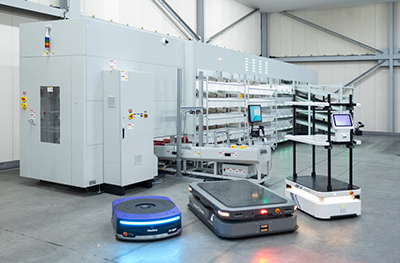
Contributing to a Carbon-Neutral Society through Technological Innovation
Decarbonization is an urgent global challenge that demands rapid and coordinated action. MC recognizes the of imporance of not only developing entirely new decarbonization technologies but also accelerating the scale-up of existing solutions, moving technologies that have completed R&D into full implementation as quickly as possible.
To help realize a carbon-neutral society, MC is actively promoting the development of energy transformation (EX)-related businesses, including next-generation energy solutions. To complement and further accelerate these efforts, MC will focus on scaling innovative decarbonization technologies through public-private partnerships.
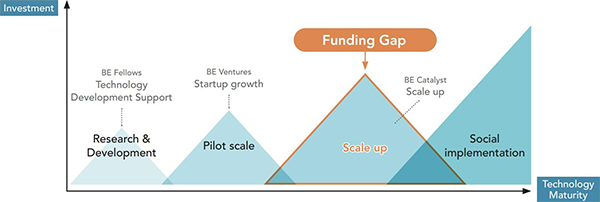
Participation in Breakthrough Energy Catalyst Program to Accelerate Decarbonization Technologies
MC is the first company in Asia to join Breakthrough Energy Catalyst (BEC), a program dedicated to accelerating the deployment of innovative decarbonization technologies across society.
BEC is a pioneering model launched under Breakthrough Energy, a network of initiatives founded in 2015 by global philanthropist Bill Gates. The program provides investment and support for projects based on advanced decarbonization technologies that have completed research and development.
MC is actively engaged in renewable energy and is exploring next-generation energy sources such as hydrogen, ammonia, and methanation. The company recognizes the critical need to leverage new technologies and innovations to meet the global challenge of transitioning to a carbon-neutral society.
BEC acts as a true “catalyst”, linking private sector and philanthropic funding, green product off-take support, and government assistance. Through these efforts, BEC is creating a framework to scale projects based on breakthrough decarbonization technologies, driving progress toward a carbon-neutral future.
Currently, BEC focuses on five key areas, including (1) clean hydrogen production and related infrastructure, (2) long-duration energy storage (LDES), (3) sustainable aviation fuels (SAF), (4) direct air capture (DAC), and (5) green manufacturing industries (steel, cement, plastics, etc.). Future expansions may include other critical decarbonization technologies. MC considers these areas essential to its EX Strategy and Roadmap to a Carbon-Neutral Society.
By participating in BEC, MC will help accelerate the adoption of innovative technologies that will reduce environmental impact without compromising quality of life.
Leveraging its expertise and networks in Japan and across Asia, MC will collaborate with BEC partners from a broad range of industries, including steel, aviation, and finance, to drive meaningful progress toward a carbon-neutral world.
